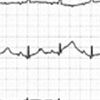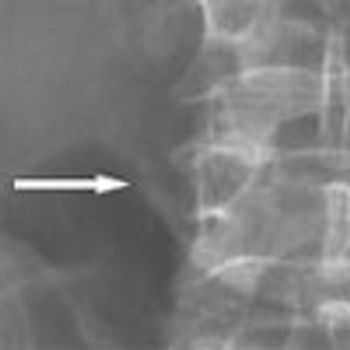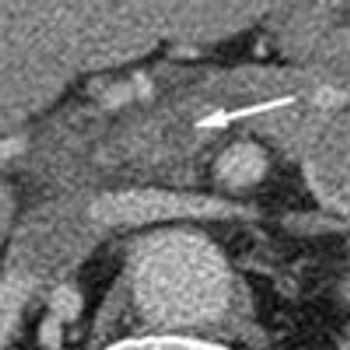
Each year about 700,000 Americans sustain a stroke, and about 29% of those patients who are aged 65 years or older die within 1 year. Worldwide, stroke is the third leading cause of death and the leading cause of severe disability in adults.


Each year about 700,000 Americans sustain a stroke, and about 29% of those patients who are aged 65 years or older die within 1 year. Worldwide, stroke is the third leading cause of death and the leading cause of severe disability in adults.

Systolic hypertension is an independent risk factor for coronary artery disease, stroke, and end-stage renal disease. Nonpharmacological interventions for systolic hypertension include limitation of dietary sodium and alcohol intake along with weight reduction and aerobic exercise.

A 22-year-old woman has had chronic nausea, emesis with green vomitus, and diarrhea for the past 10 months. The diarrhea is frequent (about 3 to 8 times daily) and does not resolve with starvation.

In the vast majority of nonsmokers who are not receiving angiotensin converting-enzyme inhibitors and who have no evidence of active disease on chest radiographs, chronic cough is caused by postnasal drip syndrome (recently renamed upper airway cough syndrome [UACS]), asthma, non-asthmatic eosinophilic bronchitis, or gastroesophageal reflux disease (GERD), alone or in combination.

A 57-year-old woman presents for follow-up several months after a series of thrombotic episodes. Four days after she underwent ankle fusion to relieve pain and edema associated with a leg fracture that had occurred 40 years earlier, she sustained a massive myocardial infarction (MI).

An obese 61-year-old man with a history of heroin abuse was brought to the hospital after he had fallen onto his buttocks on a sidewalk. He was able to stand initially, but weakness and numb-ness in his legs rendered him suddenly unable to walk or prevent himself from voiding. He denied abdominal or back pain. His medical history included asthma, chronic obstructive pulmonary disease, and hypertension.

As a busy internist who tries to keep up with current literature, I have always been dismayed at the general acceptance and even promotion of published practice guidelines by the scientific community.

A 62-year-old man presents with painful cramps in his left lower leg that began about 6 months earlier and have recently become more frequent. The cramps occur with vigorous walking and cease when he stops for several minutes.

Nephropathy develops in about 30% of patients with diabetes. Screen for albuminuria at the time type 2 diabetes is diagnosed and within 5 years of diagnosis of type 1 diabetes.

During the first quarter of a football game, a 17-year-old athlete noticed that his right (dominant) arm was swollen and heavy. Two days earlier, he had fired a shotgun right-handed multiple times while hunting.

When angiotensin-converting enzyme (ACE) inhibitors were first discovered, they were a welcome addition to the antihypertensive armamentarium. Since then, many more benefits of these drugs have been found: they slow the progression of diabetic nephropathy, abate the sequelae of heart failure when systolic dysfunction is present, and reduce the level of proteinuria in patients with nephrotic syndrome.

Acute abdominal pain, fever, and chills prompted a 51-year-old man to visit his local hospital twice in one week. On both visits, a clinical and laboratory workup was negative. He then presented to a tertiary care center with worsening symptoms. His history included hypertension and tobacco and alcohol use.

A 44-year-old man presented to the emergency department (ED) with pain and swelling of the left ankle and a petechial rash in the pretibial area that developed the night before. He also reported "fluttering" in his chest.

A 75-year-old man is concerned about the discoloration of his fingernails: each nail has dark bands with a clearing in the middle.

Despite meticulous titration of anticoagulation therapy and careful attention to confounding medications, serious bleeding complications occur in some patients who receive warfarin.

The differential diagnosis of generalized weakness is enormous; it includes disorders at all levels of the neur-axis. A variety of electrophysiological, pathological, radiographic, and other laboratory studies may be indicated depending on the specific diagnostic possibilities; costs can be controlled if such investigations are selected judiciously.

Treatment of hypertension can minimize both microvascular and macrovascular complications of diabetes and helps prevent nephropathy and cardiovascular events.

A 44-year-old man presents to the emergency department (ED) with light-headedness, nausea, and vomiting of 1 day's duration. He has also had intermittent palpitations but denies chest pain, dyspnea, and weakness.

In his article, "Heart Failure: Part 1, Diagnosis and Staging" (CONSULTANT, July 2007), why did Dr W. H. Wilson Tang omit central venous pressure and circulation time as means of diagnosing congestive heart failure? Is it possible that the simplicity and accuracy of these 2 tests, which can establish the diagnosis in 5 or 10 minutes in any hospital room-or physician's examining room-have been forgotten since the advent of testing of natriuretic peptide levels (which, as Dr Tang notes, "also increase in response to other noncardiac processes")?

Over the past 20 years, the treatment armamentarium for diabetes has greatly expanded: 8 different classes of non-insulin drugs and 8 different types of insulin are now available. The newer classes of agents include disaccharidase inhibitors, thiazolidinediones, meglitinides, glucagonlike peptide analogs, and dipeptidyl peptidase IV inhibitors.

PHILADELPHIA -- Patients taking beta-adrenergic receptor agonists were less likely to develop non-healing venous leg ulcers than those not taking the drugs, according to a large epidemiological study.

ROCKVILLE, Md. -- Eleven deaths and nearly 200 reports of serious cardiopulmonary events have been linked to microbubble contrast agents (Definity and Optison) used in echocardiography, according to the FDA.

DURHAM, N.C. -- Oncologists need to think heart when treating early breast cancer, according to clinicians here.

PARIS -- Fast assessment and treatment of transient ischemic attacks can reduce the risk of early recurrent stroke by 80%, according to researchers here and in England.

NEW YORK -- Subclinical hypothyroidism may modestly increase the risk of heart failure, researchers found.